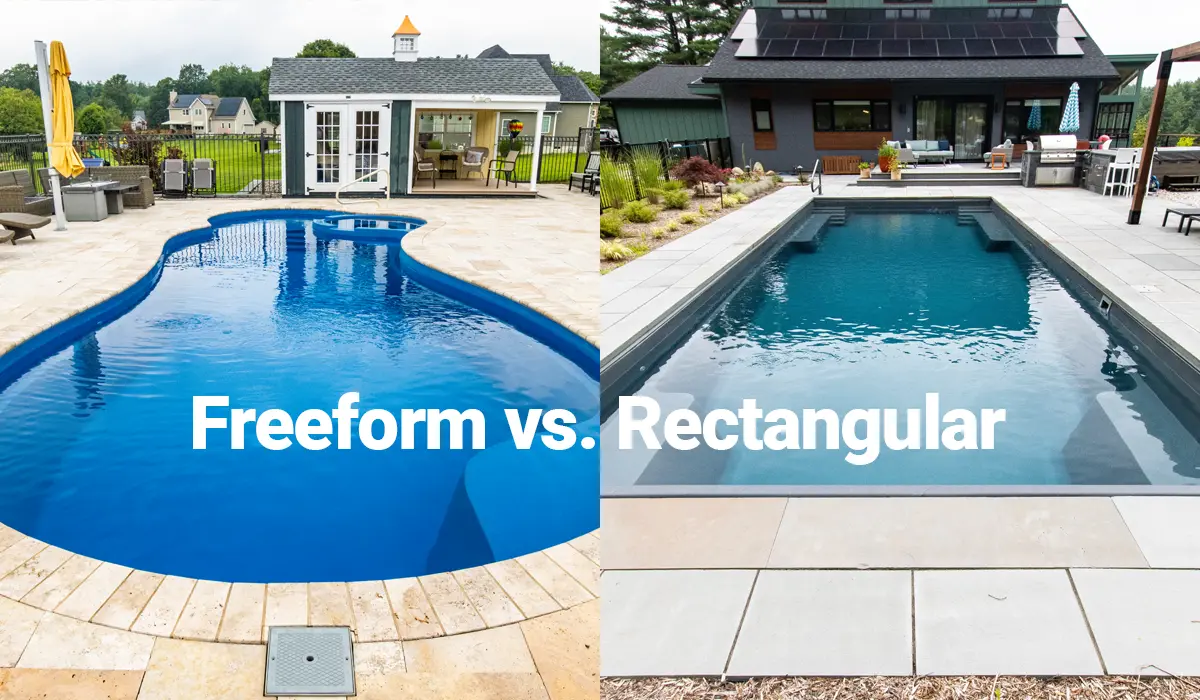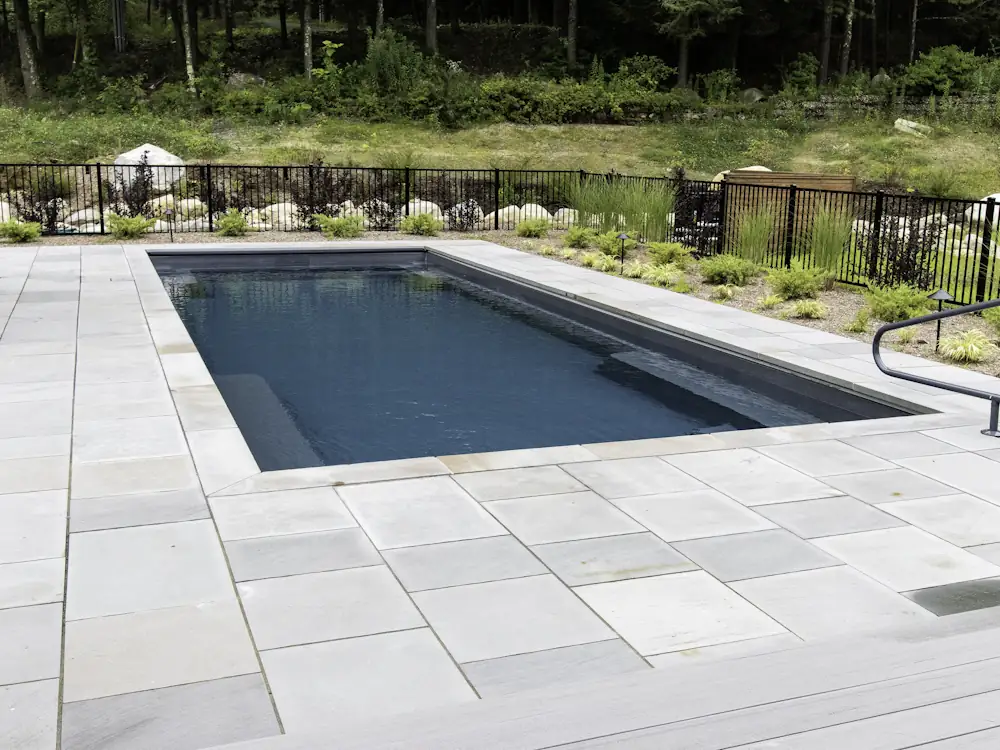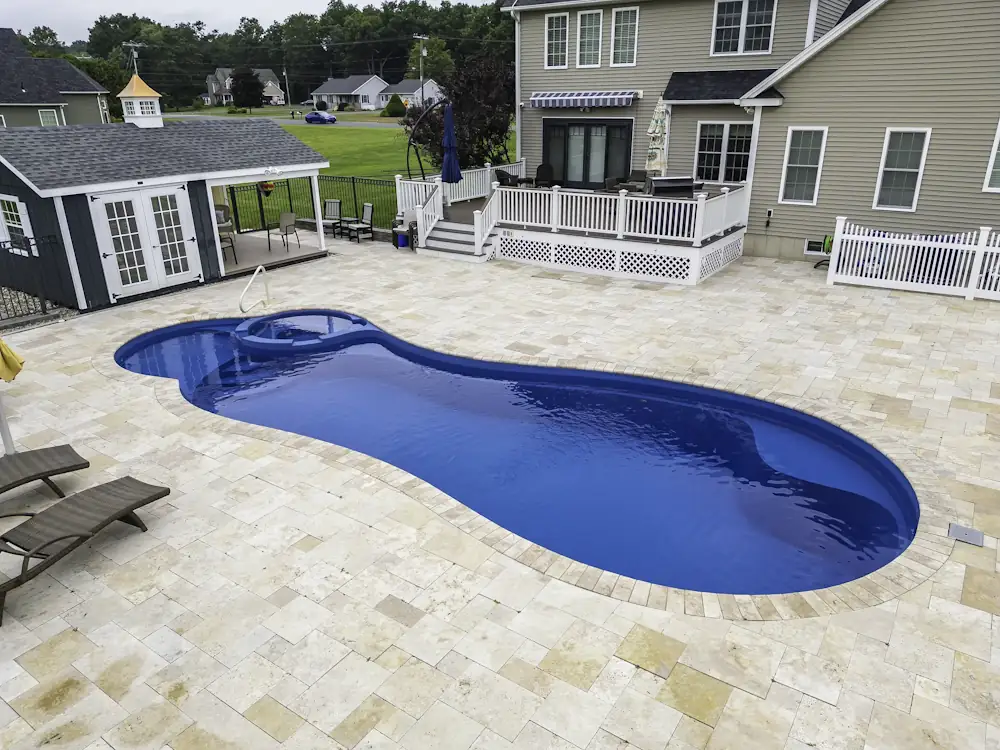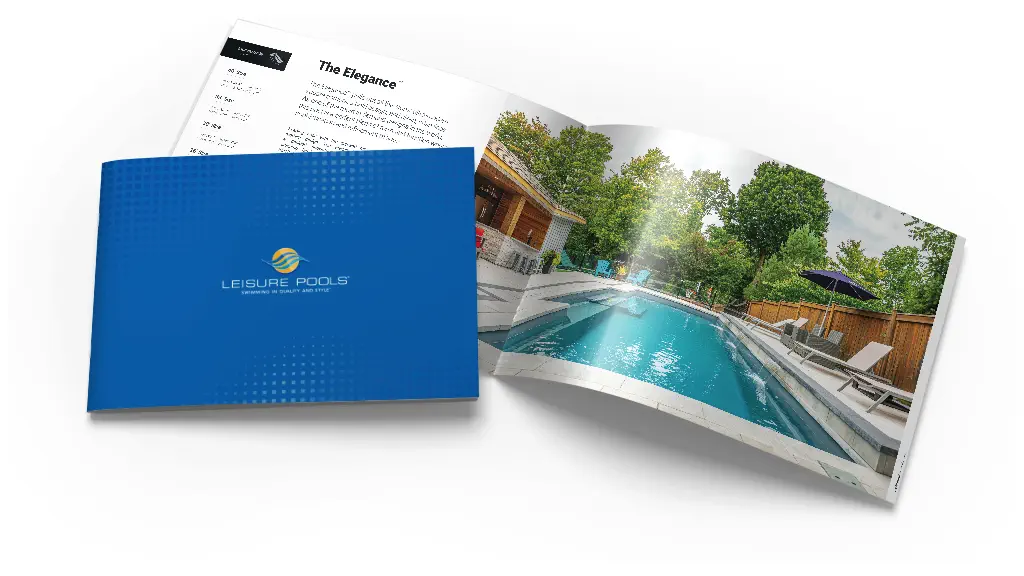
Making Waves: Choosing Between a Freeform and a Rectangular Fiberglass Pool

When it comes to transforming your backyard into a serene oasis, few investments offer the combination of relaxation, recreation, and luxury quite like a fiberglass pool. As the demand for these low-maintenance, durable pools continues to surge, one of the primary decisions homeowners face is whether to select a freeform or rectangular design. Each style from Leisure Pools carries its own unique charm, catering to different preferences and spaces. Let’s dive deeper into the considerations when choosing between a freeform or a rectangular pool.
The Timeless Elegance of Rectangular Pools
Rectangular fiberglass pools exude a timeless elegance that seamlessly integrates with modern architectural aesthetics. Their clean lines and symmetrical shape offer a sense of order and sophistication. Thus, they are a popular choice for homeowners who prefer a classic look or have a more formal landscape design.
One of the key advantages of rectangular pools lies in their versatility. Their uniform shape maximizes available swimming space, making them ideal for swimming laps, hosting aquatic activities or simply lounging in the water. Additionally, their straight edges facilitate easier installation of features like automatic pool covers, water features and integrated seating areas.
For those who value symmetry and clean design lines, a rectangular fiberglass pool serves as a canvas for creating a sleek, minimalist outdoor retreat that complements any architectural style.
Embracing Nature with Freeform Pools
On the other hand, freeform fiberglass pools embrace the organic beauty of nature, mimicking the irregular shapes found in natural bodies of water like lakes or lagoons. Their flowing, curved edges soften the landscape, creating a more relaxed and organic atmosphere reminiscent of a tropical getaway.
One of the primary appeals of freeform pools lies in their ability to adapt to various backyard layouts and terrain features. Whether nestled within a lush garden oasis or integrated into a sloping landscape, these pools effortlessly blend with their surroundings, lending a sense of tranquility and harmony to the outdoor space.
Moreover, freeform pools offer greater design flexibility, allowing for creative customization with features such as rock waterfalls, beach entries and meandering pathways. This versatility enables homeowners to craft a unique aquatic paradise that reflects their personal style and enhances the natural beauty of their property.
Choosing the Right Fit: Selecting a Freeform or a Rectangular Pool
Ultimately, the decision between a freeform and rectangular fiberglass pool boils down to personal preference, lifestyle and the specific characteristics of your backyard. Consider factors such as available space, how you want the pool to function for your needs, aesthetic preferences and how the pool will integrate with existing landscaping and outdoor living areas.
If you prioritize a sleek, contemporary look and enjoy structured activities like swimming laps, a rectangular pool may be the perfect fit for your backyard. Conversely, if you crave a more organic, relaxed ambiance with ample opportunities for creative expression, a freeform pool could be the ideal choice.
At Leisure Pools, we offer a diverse range of fiberglass pool designs, including both freeform and rectangular options, to suit every taste and lifestyle. Our expert team is dedicated to helping you select the perfect pool that not only enhances your outdoor space but also brings years of enjoyment and relaxation for you and your family.
Whichever style you choose, investing in a fiberglass pool is an investment in luxury, leisure and lasting memories. So, immerse yourself in the possibilities, make a splash and let your backyard oasis dreams come true.


Frequently Asked Questions about Choosing Between a Freeform or a Rectangular Pool
Q: What are the main differences between freeform and rectangular fiberglass pools?
A: Freeform pools feature irregular, flowing shapes that mimic natural bodies of water. Conversely, rectangular pools have straight lines and symmetrical shapes for a more formal, structured appearance.
Q: Which pool shape is better for swimming laps and exercise?
A: Rectangular pools are typically better suited for swimming laps and exercise due to their straight edges and uniform shape, allowing for more efficient swimming.
Q: Are there any limitations in terms of customization with either pool shape?
A: Both freeform and rectangular fiberglass pools offer a wide range of customization options, including features such as waterfalls, beach entries, integrated seating and more. However, some intricate designs may be easier to achieve with one shape over the other.
Q: How do the costs compare between a freeform or a rectangular pool?
A: Costs can vary depending on factors such as size, features and installation requirements. Generally, rectangular pools may be slightly more cost-effective due to their simpler construction, but individual quotes from a local dealer for Leisure Pools are necessary to determine exact pricing.
Q: Which pool shape tends to require less maintenance over time?
A: Both freeform and rectangular fiberglass pools are known for their low maintenance requirements compared to other types of pools, such as gunite and vinyl liner pools. However, rectangular pools may have slightly fewer nooks and crannies, potentially reducing cleaning time.
Q: Can I add features like waterfalls or beach entries to both freeform and rectangular fiberglass pools?
A: Yes, both pool shapes can accommodate a variety of features, including waterfalls, beach entries, spas and more. Your pool builder can help you explore customization options based on your preferences and budget.
Q: Do freeform pools fit better in certain types of landscapes compared to rectangular pools?
A: Freeform pools are well-suited for naturalistic landscapes with curves and irregular terrain. On the other hand, rectangular pools complement more formal or modern settings. However, both pool shapes can be adapted to various landscapes with proper design and planning.
Q: What considerations should I keep in mind when choosing between the two pool shapes for my backyard?
A: Consider factors such as available space, desired aesthetic, intended use (e.g., swimming, lounging, entertaining) and how the pool will integrate with existing landscaping and outdoor features.
Q: Are there any specific benefits or drawbacks to consider regarding safety features such as pool covers or fencing for each pool shape?
A: Both freeform and rectangular pool can be outfitted with safety enhancements such as pool covers and fencing to bolster security. Nevertheless, it’s important to recognize that automatic safety covers can be more seamlessly incorporated into a rectangular pool as opposed to a freeform one. This is due to the fact that rectangular pools commonly employ a submerged guide system, while freeform pools utilize an overhead track. Ultimately, the selection of safety features may hinge more on individual preference and local regulations rather than solely on the pool’s geometric shape.
Q: How long does installation typically take for both freeform and rectangular fiberglass pools?
A: Installation times can vary based on factors such as pool size, site preparation, and weather conditions. Generally, fiberglass pools have shorter installation times compared to other types of pools, with some projects completed in a matter of weeks.
Q: Are there any regulations or zoning requirements that might influence my choice between the two pool shapes?
A: Local regulations and zoning requirements may dictate setback distances, fencing regulations and other considerations that could impact your choice of pool shape. It’s important to consult with your pool builder and local authorities to ensure compliance.
Q: Can I incorporate both pool shapes into my backyard design, such as having a rectangular pool as the main feature and a freeform pool as a secondary option?
A: Yes, combining different pool shapes can create a visually dynamic and versatile backyard oasis. Your pool designer can help you integrate multiple pool shapes harmoniously into your landscape.
Q: What are the available sizes and dimensions for freeform and rectangular fiberglass pools?
A: Fiberglass pools come in a variety of sizes and shapes to suit different preferences and spaces. Standard sizes are available for both freeform and rectangular designs. Additionally, custom options may also be available to meet specific requirements.
Q: How do I determine which pool shape is best suited for my backyard space and lifestyle?
A: Consider factors such as the size and layout of your backyard, your aesthetic preferences, intended use of the pool and how it will complement your outdoor living area. Consulting with a professional pool builder can also provide valuable insights.
Q: Are there any specific recommendations or tips for maintaining and caring for freeform versus rectangular fiberglass pools?
A: Maintenance requirements for both pool shapes are similar and involve regular cleaning, water testing and chemical balancing. However, freeform pools may have more intricate features that require extra attention during cleaning. Following manufacturer guidelines and scheduling regular maintenance checks can help ensure the longevity and enjoyment of your pool, regardless of its shape.


